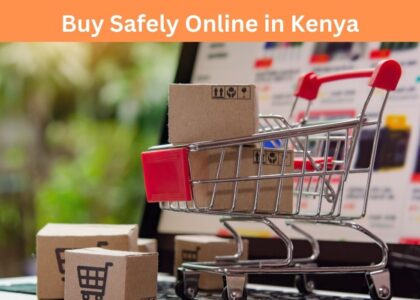1. Understanding the Risks of Online Shopping Scams in Kenya
Before diving into the specific tips and tricks for avoiding scams, it’s essential to understand the risks involved. Online shopping scams can take many forms, including:
- Fake websites: Fraudulent websites that mimic popular online stores.
- Phishing attacks: Scammers posing as trusted companies to steal your personal information.
- Counterfeit products: Sellers offering subpar or fake products at incredibly low prices.
- Payment fraud: Fraudulent payment methods that steal your financial information.
- Non-delivery scams: Sellers who take your money but never send the product.
These scams not only result in financial losses but can also compromise your personal information, leaving you vulnerable to identity theft and other forms of fraud. Fortunately, by following a few simple steps, you can protect yourself from these risks.
2. Shop Only on Trusted and Reputable Websites
One of the most effective ways to avoid scams is by shopping only on reputable and well-established websites. At SmartBuyer, we always encourage customers to verify the authenticity of the website they plan to make a purchase from.
Here’s how to ensure the legitimacy of a website:
- Check the URL: Make sure the website URL starts with “https://” (the “s” stands for secure) and has a padlock symbol in the address bar. This indicates that the site uses encryption to protect your data.
- Look for reviews: Reputable websites have user reviews and ratings that provide insights into the reliability of the site.
- Research the seller: Before making a purchase, do a quick online search for the company’s name to check for any negative reviews or scam reports.
- Avoid suspicious websites: If a website looks too good to be true (e.g., offering high-end products at extremely low prices), it probably is.
3. Use Secure Payment Methods
One of the most critical aspects of avoiding online shopping scams in Kenya is using secure payment methods. When you make a purchase online, it’s essential to protect your financial information.
Here are some secure payment methods to consider:
- Credit and debit cards: These payment methods offer a level of security, as they allow you to dispute fraudulent charges.
- Mobile payment options: Services like M-Pesa are widely used in Kenya and offer secure, encrypted transactions.
- PayPal: If available, PayPal is another secure payment method that protects your financial information during online transactions.
Avoid making payments through unsecured or untraceable methods, such as wire transfers or sending cash to unknown recipients.
4. Check for Clear Contact Information
Legitimate online stores provide clear and accessible contact information, including a physical address, customer service phone number, and email address. If the website you are considering does not provide this information or makes it difficult to contact the seller, it’s a red flag.
SmartBuyer always ensures that our contact details are easy to find, allowing customers to reach us easily in case they have questions or concerns. It’s important to look for:
- A valid phone number that you can call in case of an issue.
- An email address that is linked to the domain of the website (for example, sales@smartbuyer.co.ke).
- A physical address: While not all online stores have a physical address listed, it can provide additional assurance of the company’s legitimacy.
5. Be Wary of Too-Good-to-Be-True Offers
One of the biggest traps in online shopping scams is being lured by unbelievable deals. Scammers often post unrealistic offers on counterfeit websites, such as “70% off” sales or free products, to bait consumers into making a purchase.
At SmartBuyer, we strive to provide our customers with competitive prices and value. While sales and promotions are common, if a deal seems too good to be true, take a moment to assess the situation:
- Compare prices: Check if the deal is significantly lower than the market value for similar products.
- Look for hidden costs: Some scammers hide additional fees in the checkout process that significantly increase the final cost of the product.
- Review return policies: Reputable websites like SmartBuyer have clear and fair return policies, while scammers often have no return or refund options.
6. Read Product Descriptions and Reviews
Before making any purchase, it’s crucial to read product descriptions carefully. A legitimate online store will provide detailed information about the product, including its features, specifications, and any warranty information.
At SmartBuyer, we ensure that all our products are listed with accurate descriptions, images, and specifications to help our customers make informed decisions. Additionally, customer reviews can provide useful insights into the quality and reliability of the product you’re interested in. Look for reviews from verified buyers and avoid websites that lack any customer feedback.
7. Look for Trust Seals and Certifications
Many online stores, particularly legitimate ones, display trust seals and certifications from trusted third-party organizations to assure customers that their transactions are secure. These include:
- SSL certificate: This ensures that the website encrypts your personal information.
- Better Business Bureau (BBB) accreditation: Although more common in Western countries, BBB accreditation signifies that the business is legitimate.
- Payment gateway logos: Websites that accept secure payment methods like PayPal or Stripe often display these logos on their checkout pages.
SmartBuyer proudly displays various certifications to ensure that our customers feel secure when shopping online.
8. Monitor Your Bank Statements and Transactions
Even after making a purchase, it’s essential to monitor your bank account and credit card statements for any unusual activity. Fraudulent transactions can sometimes go unnoticed for days or weeks.
If you notice any unauthorized charges, report them to your bank immediately. The quicker you act, the more likely you are to resolve the issue.
9. Report Scams to Authorities
If you fall victim to an online scam, it’s important to report the incident to the relevant authorities in Kenya, such as the Communications Authority of Kenya (CAK) or the Directorate of Criminal Investigations (DCI). Reporting scams helps authorities investigate and take action against fraudsters, reducing the chances of others becoming victims.
At SmartBuyer, we take online fraud very seriously and cooperate with authorities to ensure a safe online shopping environment for everyone.
Avoid Online Shopping Scams in Kenya with SmartBuyer Today!
Shopping online in Kenya offers convenience and access to a wide variety of products, but it also comes with the risk of scams. By following the tips and strategies outlined in this guide, you can significantly reduce your chances of falling victim to online shopping fraud.
Remember to always shop on trusted websites, use secure payment methods, verify product details, and stay vigilant for signs of scams. At SmartBuyer, we are committed to providing a safe and secure online shopping experience for our customers, and we hope this guide helps you navigate the world of online shopping in Kenya with confidence.
For more information and to shop securely, visit us at SmartBuyer.





